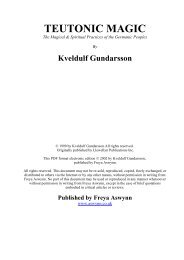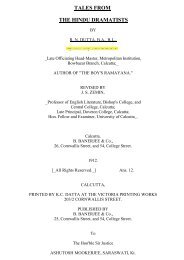Untitled - Awaken Video
Untitled - Awaken Video
Untitled - Awaken Video
Create successful ePaper yourself
Turn your PDF publications into a flip-book with our unique Google optimized e-Paper software.
Chapter 3. Midgard 71<br />
“Earth worship” indicated in these charms. The charms were conducted with the<br />
stewards of the land playing the role of Whole-maker or healer curing the land.<br />
Another ceremony, which had a relatively common form throughout the entire<br />
Germanic realm, was the leading of a wagon containing either a wooden image of<br />
a deity of fertility or a human representative of a god or goddess through the local<br />
area to promote an abundance of crops for the year. Usually, this rite took place<br />
in the spring so it can be assumed, at least according to the ideas being proffered<br />
here, that the purpose of this ceremony was to “groom the lineages of people, places,<br />
and animals” so that all had good access to power/ luck. There is a description of<br />
the rite probably related to the Goddess Nerthus in Tacitus’ Germania as having<br />
taken place in Denmark around the 1st century CE, and another two mentioned in<br />
the Flateyjárbók as having taking place in Sweden during the Viking Age. Moberg<br />
describes this ceremony and it’s probable relationship to a ceremony still conducted<br />
by the Swedish monarchy:<br />
“Each summer the wooden image of Frej [sic], set up in a wagon, made<br />
a journey through Sweden. Carried round the country to bless the grain on<br />
the fields, the god promoted the year’s growth and reproduction. It is here<br />
we probably have the origin or the Eriksgata, a progress through the realm<br />
still undertaken by Swedish kings after their accession.” 17<br />
According to Snorri in the Ynglingasaga, the kings of Sweden trace there ancestry<br />
back to the God, Frey, and because of this lineage the kings have access to the<br />
power/ luck of that lineage:<br />
“They [the kings of Sweden] were worshipped by their subjects as possessing<br />
supernatural powers. The common people believed their rulers could<br />
regulate natural processes as they pleased, distribute rain and sunshine as<br />
might best help the crops and promote the fertility of man an beast, producing<br />
healthy, well-fashioned offspring free of all blemish or deformity. Under<br />
a good king the grain was plentiful, women became pregnant, cows calved,<br />
man and beast multiplied, and no monsters were born into the worldldots. As<br />
long as a ruler could prove his divine power by the happy courses of nature,<br />
he sat safely on his throne.” 18<br />
As representative of a divine lineage, the Swedish king then traveled throughout his<br />
realm to allow all lands, beasts, and men to interact with him so that lineages were<br />
intertwined and all life within the realm were increased in power/ luck. Lineage<br />
interacts with lineage to improve access to luck/ power regardless of whether one is<br />
17 Vilhelm Moberg, A History of the Swedish People, pp. 56-57.<br />
18 Moberg, p. 56.
















